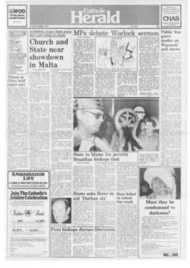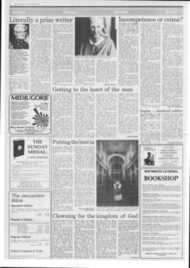Page 1, 28th September 1984
Page 1

Report an error
Noticed an error on this page?If you've noticed an error in this article please click here to report it.
Tags
Share
Related articles
Worlock Condemns Coal Intransigence
Archbishop Lauds "good Servant"
Coal Peace Talks Initiative
Corrie Bill Falls After Filibuster
Sabbath
MPs debate Worlock sermon
by Jack O'Sullivan
'CATHOLIC MPs from across the political spectrum have spoken out in support of the stance taken by Archbishop Derek Worlock in his sermon last Sunday in which he said the coal dispute was "a symptom of (he failure of our society to come to terms with the postindustrial age."
Liberal MP David Alton from Liverpool said he welcomed the sermon and felt it was a shame that it had been confused with the earlier statement by Dr Jenkins, Anglican Bishop of Durham.
He said that Bishop Jenkins "seemed to think that all the concessions must come from one side," whereas, Mr Alton pointed out "Archbishop Worlock was right to talk of the crucial broader question of what to do in the eleventh hour of the industrial era."
Major Sir Patrick Wall, Conservative MP for Beverley, said that the Archbishop had rightly posed the question but hadn't offered any solutions. He added that although he thought the National Coal Board should offer compensation and alternative employment to miners from closed pits, as well as support for the communities, the miners "have to face the facts of life that uneconomic pits cannot be kept open for ever."
He strongly supported Mr MacGregors actions and added, "I think Arthur Scargill is a revolutionary and the sooner the bishops realise that the better."
Hull Labour MP, Kevin MacNamara said emphatically "I think that it is quite right that Church leaders should play a role in applying Christian principles to a social question .. . and when it involves the crushing of industrial communities they have a particular role to play."
However, he was critical of the Church's role in the dispute to date. "I think the Christian Church as a whole has failed to express the loss of human dignity involved in the great increase in unemployment and, if they regard it as unfair, that has not got across to the people," said the north-east MP.
The Archbishop of Liverpool was careful not to single out any individual personalities for criticism in his sermon. He was concerned to see the dispute as more than "the mere intransigence of two strongwilled men". He emphasised that the strike had brought out clearly the question of "what is to happen to whole communities when the industry about which their lives have been bound ap . . is judged to be no longer profitable, practical or even the best way of doing things, of serving the wider community."
The Anglican Bishop of Durham was more outspoken than Archbishop Worlock and concerned with the coal dispute in particular. He argued against either side gaining a "victory" and chastised the miners for their intransigence and violence while condemning the Government for its attempts to "defeat" the miners.
Mr Alton agreed with Dr Jenkins' call for the removal of Mr MacGregor as chairman of the National Coal Board, as a gesture of reconciliation with the National Union of Miners.
As far as the Church playing a bigger role in the dispute is concerned, Fr Paul Thompson of the Liverpool Catholic cress Office was leaving all doors open this week. He said, "If ever the opportunity arose, the Church in this country would have much to offer in bringing about reconciliation."
Editorial comment — page 4 Archbishop Warlock's Speech — page 3
blog comments powered by Disqus











